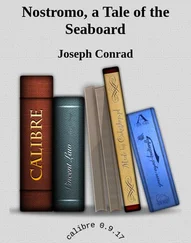Джозеф Конрад - Nostromo - A Tale of the Seaboard
Здесь есть возможность читать онлайн «Джозеф Конрад - Nostromo - A Tale of the Seaboard» весь текст электронной книги совершенно бесплатно (целиком полную версию без сокращений). В некоторых случаях можно слушать аудио, скачать через торрент в формате fb2 и присутствует краткое содержание. Год выпуска: 2006, Жанр: Классическая проза, на английском языке. Описание произведения, (предисловие) а так же отзывы посетителей доступны на портале библиотеки ЛибКат.
- Название:Nostromo: A Tale of the Seaboard
- Автор:
- Жанр:
- Год:2006
- ISBN:нет данных
- Рейтинг книги:4 / 5. Голосов: 1
-
Избранное:Добавить в избранное
- Отзывы:
-
Ваша оценка:
- 80
- 1
- 2
- 3
- 4
- 5
Nostromo: A Tale of the Seaboard: краткое содержание, описание и аннотация
Предлагаем к чтению аннотацию, описание, краткое содержание или предисловие (зависит от того, что написал сам автор книги «Nostromo: A Tale of the Seaboard»). Если вы не нашли необходимую информацию о книге — напишите в комментариях, мы постараемся отыскать её.
Nostromo: A Tale of the Seaboard — читать онлайн бесплатно полную книгу (весь текст) целиком
Ниже представлен текст книги, разбитый по страницам. Система сохранения места последней прочитанной страницы, позволяет с удобством читать онлайн бесплатно книгу «Nostromo: A Tale of the Seaboard», без необходимости каждый раз заново искать на чём Вы остановились. Поставьте закладку, и сможете в любой момент перейти на страницу, на которой закончили чтение.
Интервал:
Закладка:
The little group of engineers received this exhortation without a word, and after waving his hand at them loftily, he addressed himself again to Mrs. Gould—
“That is what Don Jose says we must do. Be enterprising! Work! Grow rich! To put Montero in a cage is my work; and when that insignificant piece of business is done, then, as Don Jose wishes us, we shall grow rich, one and all, like so many Englishmen, because it is money that saves a country, and—”
But a young officer in a very new uniform, hurrying up from the direction of the jetty, interrupted his interpretation of Senor Avellanos’s ideals. The general made a movement of impatience; the other went on talking to him insistently, with an air of respect. The horses of the Staff had been embarked, the steamer’s gig was awaiting the general at the boat steps; and Barrios, after a fierce stare of his one eye, began to take leave. Don Jose roused himself for an appropriate phrase pronounced mechanically. The terrible strain of hope and fear was telling on him, and he seemed to husband the last sparks of his fire for those oratorical efforts of which even the distant Europe was to hear. Antonia, her red lips firmly closed, averted her head behind the raised fan; and young Decoud, though he felt the girl’s eyes upon him, gazed away persistently, hooked on his elbow, with a scornful and complete detachment. Mrs. Gould heroically concealed her dismay at the appearance of men and events so remote from her racial conventions, dismay too deep to be uttered in words even to her husband. She understood his voiceless reserve better now. Their confidential intercourse fell, not in moments of privacy, but precisely in public, when the quick meeting of their glances would comment upon some fresh turn of events. She had gone to his school of uncompromising silence, the only one possible, since so much that seemed shocking, weird, and grotesque in the working out of their purposes had to be accepted as normal in this country. Decidedly, the stately Antonia looked more mature and infinitely calm; but she would never have known how to reconcile the sudden sinkings of her heart with an amiable mobility of expression.
Mrs. Gould smiled a good-bye at Barrios, nodded round to the Europeans (who raised their hats simultaneously) with an engaging invitation, “I hope to see you all presently, at home”; then said nervously to Decoud, “Get in, Don Martin,” and heard him mutter to himself in French, as he opened the carriage door, “ Le sort en est jete .” She heard him with a sort of exasperation. Nobody ought to have known better than himself that the first cast of dice had been already thrown long ago in a most desperate game. Distant acclamations, words of command yelled out, and a roll of drums on the jetty greeted the departing general. Something like a slight faintness came over her, and she looked blankly at Antonia’s still face, wondering what would happen to Charley if that absurd man failed. “A la casa, Ignacio,” she cried at the motionless broad back of the coachman, who gathered the reins without haste, mumbling to himself under his breath, “Si, la casa. Si, si nina.”
The carriage rolled noiselessly on the soft track, the shadows fell long on the dusty little plain interspersed with dark bushes, mounds of turned-up earth, low wooden buildings with iron roofs of the Railway Company; the sparse row of telegraph poles strode obliquely clear of the town, bearing a single, almost invisible wire far into the great campo—like a slender, vibrating feeler of that progress waiting outside for a moment of peace to enter and twine itself about the weary heart of the land.
The cafe window of the Albergo d’ltalia Una was full of sunburnt, whiskered faces of railway men. But at the other end of the house, the end of the Signori Inglesi, old Giorgio, at the door with one of his girls on each side, bared his bushy head, as white as the snows of Higuerota. Mrs. Gould stopped the carriage. She seldom failed to speak to her protege; moreover, the excitement, the heat, and the dust had made her thirsty. She asked for a glass of water. Giorgio sent the children indoors for it, and approached with pleasure expressed in his whole rugged countenance. It was not often that he had occasion to see his benefactress, who was also an Englishwoman—another title to his regard. He offered some excuses for his wife. It was a bad day with her; her oppressions—he tapped his own broad chest. She could not move from her chair that day.
Decoud, ensconced in the corner of his seat, observed gloomily Mrs. Gould’s old revolutionist, then, offhand—
“Well, and what do you think of it all, Garibaldino?”
Old Giorgio, looking at him with some curiosity, said civilly that the troops had marched very well. One-eyed Barrios and his officers had done wonders with the recruits in a short time. Those Indios, only caught the other day, had gone swinging past in double quick time, like bersaglieri; they looked well fed, too, and had whole uniforms. “Uniforms!” he repeated with a half-smile of pity. A look of grim retrospect stole over his piercing, steady eyes. It had been otherwise in his time when men fought against tyranny, in the forests of Brazil, or on the plains of Uruguay, starving on half-raw beef without salt, half naked, with often only a knife tied to a stick for a weapon. “And yet we used to prevail against the oppressor,” he concluded, proudly.
His animation fell; the slight gesture of his hand expressed discouragement; but he added that he had asked one of the sergeants to show him the new rifle. There was no such weapon in his fighting days; and if Barrios could not—
“Yes, yes,” broke in Don Jose, almost trembling with eagerness. “We are safe. The good Senor Viola is a man of experience. Extremely deadly—is it not so? You have accomplished your mission admirably, my dear Martin.”
Decoud, lolling back moodily, contemplated old Viola.
“Ah! Yes. A man of experience. But who are you for, really, in your heart?”
Mrs. Gould leaned over to the children. Linda had brought out a glass of water on a tray, with extreme care; Giselle presented her with a bunch of flowers gathered hastily.
“For the people,” declared old Viola, sternly.
“We are all for the people—in the end.”
“Yes,” muttered old Viola, savagely. “And meantime they fight for you. Blind. Esclavos!”
At that moment young Scarfe of the railway staff emerged from the door of the part reserved for the Signori Inglesi. He had come down to headquarters from somewhere up the line on a light engine, and had had just time to get a bath and change his clothes. He was a nice boy, and Mrs. Gould welcomed him.
“It’s a delightful surprise to see you, Mrs. Gould. I’ve just come down. Usual luck. Missed everything, of course. This show is just over, and I hear there has been a great dance at Don Juste Lopez’s last night. Is it true?”
“The young patricians,” Decoud began suddenly in his precise English, “have indeed been dancing before they started off to the war with the Great Pompey.”
Young Scarfe stared, astounded. “You haven’t met before,” Mrs. Gould intervened. “Mr. Decoud—Mr. Scarfe.”
“Ah! But we are not going to Pharsalia,” protested Don Jose, with nervous haste, also in English. “You should not jest like this, Martin.”
Antonia’s breast rose and fell with a deeper breath. The young engineer was utterly in the dark. “Great what?” he muttered, vaguely.
“Luckily, Montero is not a Caesar,” Decoud continued. “Not the two Monteros put together would make a decent parody of a Caesar.” He crossed his arms on his breast, looking at Senor Avellanos, who had returned to his immobility. “It is only you, Don Jose, who are a genuine old Roman—vir Romanus—eloquent and inflexible.”
Читать дальшеИнтервал:
Закладка:
Похожие книги на «Nostromo: A Tale of the Seaboard»
Представляем Вашему вниманию похожие книги на «Nostromo: A Tale of the Seaboard» списком для выбора. Мы отобрали схожую по названию и смыслу литературу в надежде предоставить читателям больше вариантов отыскать новые, интересные, ещё непрочитанные произведения.
Обсуждение, отзывы о книге «Nostromo: A Tale of the Seaboard» и просто собственные мнения читателей. Оставьте ваши комментарии, напишите, что Вы думаете о произведении, его смысле или главных героях. Укажите что конкретно понравилось, а что нет, и почему Вы так считаете.












